Fleurs du Mal Magazine


Like Richard Ellmann’s James Joyce, Richard Zenith’s Pessoa immortalizes the life of one of the twentieth century’s greatest writers.
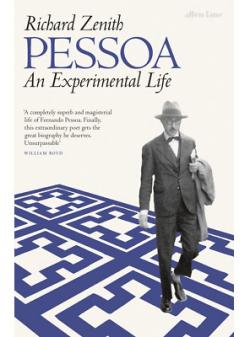 Nearly a century after his wrenching death, the Portuguese poet Fernando Pessoa (1888–1935) remains one of our most enigmatic writers. Believing he could do “more in dreams than Napoleon,” yet haunted by the specter of hereditary madness, Pessoa invented dozens of alter egos, or “heteronyms,” under whose names he wrote in Portuguese, English, and French.
Nearly a century after his wrenching death, the Portuguese poet Fernando Pessoa (1888–1935) remains one of our most enigmatic writers. Believing he could do “more in dreams than Napoleon,” yet haunted by the specter of hereditary madness, Pessoa invented dozens of alter egos, or “heteronyms,” under whose names he wrote in Portuguese, English, and French.
Unsurprisingly, this “most multifarious of writers” (Guardian) has long eluded a definitive biographer—but in renowned translator and Pessoa scholar Richard Zenith, he has met his match.
Relatively unknown in his lifetime, Pessoa was all but destined for literary oblivion when the arc of his afterlife bent, suddenly and improbably, toward greatness, with the discovery of some 25,000 unpublished papers left in a large, wooden trunk. Drawing on this vast archive of sources as well as on unpublished family letters, and skillfully setting the poet’s life against the nationalist currents of twentieth-century European history, Zenith at last reveals the true depths of Pessoa’s teeming imagination and literary genius.
Much as Nobel laureate José Saramago brought a single heteronym to life in The Year of the Death of Ricardo Reis, Zenith traces the backstories of virtually all of Pessoa’s imagined personalities, demonstrating how they were projections, spin-offs, or metamorphoses of Pessoa himself. A solitary man who had only one, ultimately platonic love affair, Pessoa used his and his heteronyms’ writings to explore questions of sexuality, to obsessively search after spiritual truth, and to try to chart a way forward for a benighted and politically agitated Portugal.
Although he preferred the world of his mind, Pessoa was nonetheless a man of the places he inhabited, including not only Lisbon but also turn-of-the-century Durban, South Africa, where he spent nine years as a child. Zenith re-creates the drama of Pessoa’s adolescence—when the first heteronyms emerged—and his bumbling attempts to survive as a translator and publisher.
Zenith introduces us, too, to Pessoa’s bohemian circle of friends, and to Ophelia Quieroz, with whom he exchanged numerous love letters.
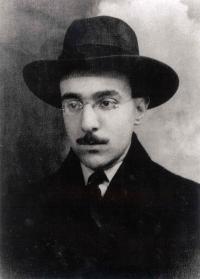 Pessoa reveals in equal force the poet’s unwavering commitment to defending homosexual writers whose books had been banned, as well as his courageous opposition to Salazar, the Portuguese dictator, toward the end of his life. In stunning, magisterial prose, Zenith contextualizes Pessoa’s posthumous literary achievements—especially his most renowned work, The Book of Disquiet.
Pessoa reveals in equal force the poet’s unwavering commitment to defending homosexual writers whose books had been banned, as well as his courageous opposition to Salazar, the Portuguese dictator, toward the end of his life. In stunning, magisterial prose, Zenith contextualizes Pessoa’s posthumous literary achievements—especially his most renowned work, The Book of Disquiet.
A modern literary masterpiece, Pessoa simultaneously immortalizes the life of a literary maestro and confirms the enduring power of Pessoa’s work to speak prophetically to the disconnectedness of our modern world.
Richard Zenith (1956, Washington, D.C.) is an American-Portuguese writer and translator, winner of Pessoa Prize in 2012.
Pessoa
A Biography
by Richard Zenith (Author)
Published by Liveright
July 20, 2021
Language : English
Hardcover : 1088 pages
ISBN-10 : 0871404710
ISBN-13 : 978-0871404718
$40.00
# new biography
Fernando Pessoa
Richard Zenith
• fleursdumal.nl magazine
More in: #Biography Archives, #Editors Choice Archiv, - Book News, - Bookstores, Archive O-P, Archive Y-Z, Art & Literature News, Pessoa, Fernando, TRANSLATION ARCHIVE

Jack And The Bean-Stalk
A lazy and careless boy was Jack,–
He would not work, and he would not play;
And so poor, that the jacket on his back
Hung in a ragged fringe alway;
But ’twas shilly-shally, dilly-dally,
From day to day.
At last his mother was almost wild,
And to get them food she knew not how;
And she told her good-for-nothing child
To drive to market the brindle cow.
So he strolled along, with whistle and song,
And drove the cow.
A man was under the wayside trees,
Who carried some beans in his hand–all white.
He said, “My boy, I’ll give you these
For the brindle cow.” Jack said, “All right.”
And, without any gold for the cow he had sold,
Went home at night.
Bitter tears did the mother weep;
Out of the window the beans were thrown,
And Jack went supperless to sleep;
But, when the morning sunlight shone,
High, and high, to the very sky,
The beans had grown.
They made a ladder all green and bright,
They twined and crossed and twisted so;
And Jack sprang up it with all his might,
And called to his mother down below:
“Hitchity-hatchet, my little red jacket,
And up I go!”
High as a tree, then high as a steeple,
Then high as a kite, and high as the moon,
Far out of sight of cities and people,
He toiled and tugged and climbed till noon;
And began to pant: “I guess I shan’t
Get down very soon!”
At last he came to a path that led
To a house he had never seen before;
And he begged of a woman there some bread;
But she heard her husband, the Giant, roar,
And she gave him a shove in the old brick oven,
And shut the door.
And the Giant sniffed, and beat his breast,
And grumbled low, “Fe, fi, fo, fum!”
His poor wife prayed he would sit and rest,–
“I smell fresh meat! I will have some!”
He cried the louder, “Fe, fi, fo, fum!
I will have some.”
He ate as much as would feed ten men,
And drank a barrel of beer to the dregs;
Then he called for his little favorite hen,
As under the table he stretched his legs,–
And he roared “Ho! ho!”–like a buffalo–
“Lay your gold eggs!”
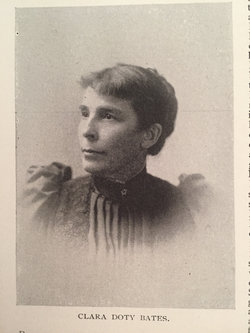
She laid a beautiful egg of gold;
And at last the Giant began to snore;
Jack waited a minute, then, growing bold,
He crept from the oven along the floor,
And caught the hen in his arms, and then
Fled through the door.
But the Giant heard him leave the house,
And followed him out, and bellowed “Oh-oh!”
But Jack was as nimble as a mouse,
And sang as he rapidly slipped below:
“Hitchity-hatchet, my little red jacket,
And down I go!”
And the Giant howled, and gnashed his teeth.
Jack got down first, and, in a flash,
Cut the ladder from underneath;
And Giant and Bean-stalk, in one dash,–
No shilly-shally, no dilly-dally,–
Fell with a crash.
This brought Jack fame, and riches, too;
For the little gold-egg hen would lay
An egg whenever he told her to,
If he asked one fifty times a day.
And he and his mother lived with each other
In peace alway.
Clara Doty Bates
(1838 – 1895)
Jack And The Bean-Stalk
Versified by Mrs. Clara Doty Bates
fleursdumal.nl magazine
More in: Archive A-B, Archive A-B, Bates, Clara Doty, Children's Poetry, Grimm, Andersen e.o.: Fables, Fairy Tales & Stories, Tales of Mystery & Imagination
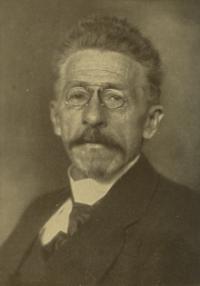
Ganz still zuweilen . . .
Ganz still zuweilen wie ein Traum
klingt in dir auf ein fernes Lied…
Du weißt nicht, wie es plötzlich kam,
du weißt nicht, was es von dir will…
und wie ein Traum ganz leis und still
verklingt es wieder, wie es kam…
Wie plötzlich mitten im Gewühl
der Straße, mitten oft im Winter
ein Hauch von Rosen dich umweht,
wie oder dann und wann ein Bild
aus längst vergessenen Kindertagen
mit fragenden Augen vor dir steht…
Ganz still und leise, wie ein Traum…
Du weißt nicht, wie es plötzlich kam,
du weißt nicht, was es von dir will,
und wie ein Traum ganz leis und still
verblaßt es wieder, wie es kam.
Cäsar Flaischlen
(1864-1920)
Ganz still zuweilen . . .
• fleursdumal.nl magazine
More in: # Classic Poetry Archive, Archive E-F, Archive E-F
The long-awaited autobiography of the legendary Nirvana and Foo Fighters rock star, Dave Grohl.
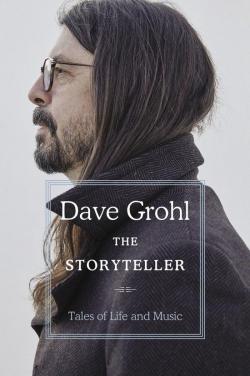 So, I’ve written a book. Having entertained the idea for years, and even offered a few questionable opportunities (‘It’s a piece of cake! Just do four hours of interviews, find someone else to write it, put your face on the cover, and voila!’), I have decided to write these stories just as I have always done, in my own hand.
So, I’ve written a book. Having entertained the idea for years, and even offered a few questionable opportunities (‘It’s a piece of cake! Just do four hours of interviews, find someone else to write it, put your face on the cover, and voila!’), I have decided to write these stories just as I have always done, in my own hand.
The joy that I have felt from chronicling these tales is not unlike listening back to a song that I’ve recorded and can’t wait to share with the world, or reading a primitive journal entry from a stained notebook, or even hearing my voice bounce between the Kiss posters on my wall as a child. This certainly doesn’t mean that I’m quitting my day job, but it does give me a place to shed a little light on what it’s like to be a kid from Springfield, Virginia, walking through life while living out the crazy dreams I had as young musician.
From hitting the road with Scream at 18 years old, to my time in Nirvana and the Foo Fighters, jamming with Iggy Pop or playing at the Academy Awards or dancing with AC/DC and the Preservation Hall Jazz Band, drumming for Tom Petty or meeting Sir Paul McCartney at Royal Albert Hall, bedtime stories with Joan Jett or a chance meeting with Little Richard, to flying halfway around the world for one epic night with my daughters…the list goes on. I look forward to focusing the lens through which I see these memories a little sharper for you with much excitement.
Dave Grohl is an award-winning musician and director. He has been one of the most beloved and respected figures on the international music since his recorded debut with Nirvana on 1991’s generation-defining Nevermind. Grohl took centre stage with Foo Fighters’ 1995 self-titled debut album, and the band have gone on to win twelve Grammys and five Brit Awards. Their most recent album, Medicine at Midnight, went to No 1 on the UK charts. In 2013, Grohl made his debut as a feature director/producer with the acclaimed documentary Sound City. Grohl also directed the eight-part HBO docuseries Foo Fighters: Sonic Highways, which premiered in October 2014 and went on to win two Emmys.
The Storyteller,
Tales of Life and Music
by Dave Grohl
5 Oct. 2021
Publisher: Simon & Schuster UK
Language: English
Hardcover: 384 pages
ISBN-10 : 1398503703
ISBN-13 : 978-1398503700
Dimensions: 15.3 x 3.25 x 23.4 cm
€ 26,95
#new books
Dave Grohl
The Storyteller
• fleursdumal.nl magazine
More in: # Music Archive, #Biography Archives, - Book News, - Bookstores, Archive G-H
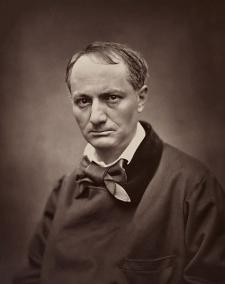
Sonnet d’automne
Ils me disent, tes yeux, clairs comme le cristal:
«Pour toi, bizarre amant, quel est donc mon mérite?»
— Sois charmante et tais-toi! Mon coeur, que tout irrite,
Excepté la candeur de l’antique animal,
Ne veut pas te montrer son secret infernal,
Berceuse dont la main aux longs sommeils m’invite,
Ni sa noire légende avec la flamme écrite.
Je hais la passion et l’esprit me fait mal!
Aimons-nous doucement. L’Amour dans sa guérite,
Ténébreux, embusqué, bande son arc fatal.
Je connais les engins de son vieil arsenal:
Crime, horreur et folie! — Ô pâle marguerite!
Comme moi n’es-tu pas un soleil automnal,
Ô ma si blanche, ô ma si froide Marguerite?
Charles Baudelaire
(1821 – 1867)
Sonnet d’automne
Fleurs du mal (Flowers of Evil)
• fleursdumal.nl magazine
More in: Archive A-B, Archive A-B, Baudelaire, Les Fleurs du Mal

China 1899
She lies, a grave disdain all her defence,
Too imperturbable for scorn. She hears
Only the murmur of the flowing years
That thunder slowly on her shores immense
And ebb away in moaning impotence.
Giants enduring, she and Time are peers—
Her dream-hazed eyes knowing no hopes, no tears,
Her glance a langour-lidded insolence.
And though the rabble of the restless West
In her deserted courts set their rash sway,
She heeds them not; as when the sun, withdrawn
From his untarnished sky, knows it distressed
By storm of weakling stars, that he at dawn
Will wither with one ruthless glance away.
Arthur Adams
(1872-1936)
China 1899
• fleursdumal.nl magazine
More in: Adams, Arthur, Archive A-B, Archive A-B
Vincent Berquez is a poet and artist, living in London with his wife and son. He was born to French parents and attended the French Lycée and Cannock boarding school.
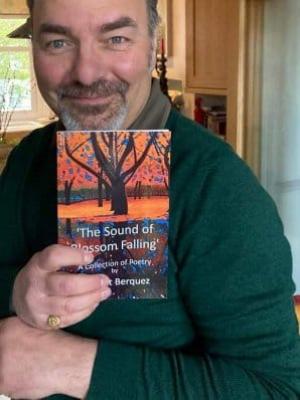 Berquez studied Fine Art at Goldsmith’s; followed by The Camden Institute, where he was taught by Frank Auerbach.
Berquez studied Fine Art at Goldsmith’s; followed by The Camden Institute, where he was taught by Frank Auerbach.
He worked as an artist for many years prior to studying museology and conservation at London University following which he worked as a curator and conserver at various institutions, including the British Museum, and the Louvre.
Berquez has published in Britain, Europe, America and New Zealand. His work is in many anthologies, collections and magazine worldwide. Vincent Berquez was requested to write a Tribute as part of ‘Poems to the American People’ for the Hastings International Poetry Festival for 9/11, read by the mayor of New York at the podium.
He has also been commissioned to write an eulogy by the son of Chief Albert Nwanzi Okoluko, the Ogimma Obi of Ogwashi-Uku to commemorate the death of his father.
Vincent Berquez has been a judge many times, including for Manifold Magazine and had work read as part of Manifold Voices at Waltham Abbey. He has recited many times, including at The Troubadour and the Pitshanger Poets, in London. In 2006 his name was put forward with the Forward Prize for Literature. Recently he was awarded a prize with Decanto Magazine. Berquez is now a member of London Voices who meet monthly in London, U.K
Berquez has also been collaborating in 07/08 with a Scottish composer and US film maker to produce a song-cycle of seven of his poems for mezzo-soprano and solo piano. These are being recorded at the Royal College of Music under the directorship of the concert pianist, Julian Jacobson. In 2009 he contributed 5 poems for the edition of A Generation Defining Itself, as well as 3 poems for Eleftheria Lialios’s book on wax dolls published in Chicago. He also made poetry films that have been shown at various venues, including a Polish/British festival in London, Jan 07.
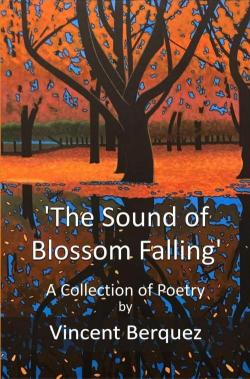 As an artist Vincent Berquez has exhibited world wide, winning prizes, such as at the Novum Comum 88’ Competition in Como, Italy. He has also worked with an art’s group, called Eins von Hundert, from Cologne, Germany for over 16 years. Berquez has shown his work at the Institute of Art in Chicago, US, as well as many galleries and institutions worldwide.
As an artist Vincent Berquez has exhibited world wide, winning prizes, such as at the Novum Comum 88’ Competition in Como, Italy. He has also worked with an art’s group, called Eins von Hundert, from Cologne, Germany for over 16 years. Berquez has shown his work at the Institute of Art in Chicago, US, as well as many galleries and institutions worldwide.
Recently he showed his paintings at the Lambs Conduit Festival, he took part in a group show called Gazing on Salvation, reciting his poetry for Lent and exhibiting paintings/collages.
He had a one-man show at Sacred Spaces Gallery with his Christian collages in 2007. In 2008 Vincent Berquez had a solo show of paintings at The Foundlings Museum and in 2011 an exposition with new work in Langham Gallery London.
Vincent Berquez has published regularly in fleursdumal.nl magazine for many years.
His book of poetry, called: The Sound of Blossom Falling, was recently published by CyberWit in London.
“The main point about these poems is deep emotion and concrete theme. We notice very impressive ardour of imagination in these poem.”
The Sound of Blossom falling
He talks of her with the simple love of a father,
describing how they walked the verdant path
and along the softness of the hardy hills
entwined in each other’s presence.
He feeds the dialogue of his love of nature
as he gazes and points out
the crisp colours and myriad greens –
he asks if she sees what he sees,
if she hears what he hears –
and as she looks and thinks
with a bright child’s mind
she says ‘I can hear the sound of blossom falling.’
They both stand still and listen for a moment.
The Sound of Blossom Falling
Author: Vincent Berquez
Poetry
Binding: Paperback
Language: English
86 pages
Publisher: Cyberwit.net
Pub. Date: 2021
ISBN-10: 9390601096
ISBN-13: 978-9390601097
Dimensions: 13.97 x 0.56 x 21.59 cm
£10.89
• fleursdumal.nl magazine
More in: #Editors Choice Archiv, - Book News, - Bookstores, Archive A-B, Archive A-B, Berquez, Vincent
Pietà. De geschiedenis van de mens is de geschiedenis van de emotie
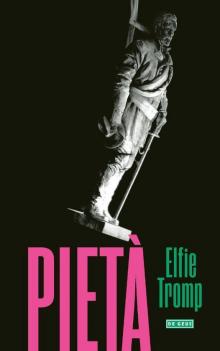 •Een stad onder druk.
•Een stad onder druk.
•Een omstreden standbeeld.
•En nu?
Elfie Tromp (1985) is schrijver en performer. Eerder werk van haar hand werd genomineerd voor verschillende prijzen.
‘Haar proza knettert, choqueert, verwart en verkent nieuwe terreinen. Ze ontregelt en toch klopt alles. Maar bovenal: het is grappig, visionair en stemt tot nadenken.’ – Adriaan van Dis
‘Een roman over botsende wereldbeelden die getuigt van durf en ambitie: veelkantig als een ideeënroman, spannend als een Netflixserie!’ – Hanna Bervoets
 Pietà.
Pietà.
De geschiedenis van de mens is de geschiedenis van de emotie
Auteur: Elfie Tromp
Taal: Nederlands
Paperback
Druk 1
Publicatiedatum: 28-09-2021
376 pagina’s
Uitgever de Geus
NUR: 301
ISBN: 9789044543766
Prijs: € 20,00
# new books
Elfie Tromp
Pietà
• fleursdumal.nl magazine
More in: #Editors Choice Archiv, - Book News, - Bookstores, Archive S-T, Elfie Tromp
Last evening the T. S. Eliot Prize 2021 – Shortlist was announced.
It shows an eclectic mixture of established poets, none of whom has previously won the Prize, and relative newcomers.
Judges Glyn Maxwell (Chair), Caroline Bird and Zaffar Kunial have chosen the 2021 T. S. Eliot Prize shortlist from a record 177 poetry collections submitted by British and Irish publishers.
The list comprises one debut collection; work from six men and four women; one American; one poet from Ireland; as well as poets of mixed race ancestry, including Jamaican, Jamaican-Chinese and Zambian. Eight publishers are represented, with two titles from small presses.

Here are the ten poets who have been shortlisted by the judges:
Raymond Antrobus – All the Names Given (Picador)
Raymond Antrobus is the author of To Sweeten Bitter and The Perseverance (Penned in the Margins/Tin House) and All the Names Given (Picador 2021). In 2019 he became the first ever poet to be awarded the Rathbone Folio Prize. Other accolades include the Ted Hughes Award, PBS Winter Choice and Sunday Times Young Writer of the year award, as well as being shortlisted for the Griffin Prize and Forward Prize.
Kayo Chingonyi – A Blood Condition (Chatto & Windus)
Kayo Chingonyi is the author of two pamphlets. His first full-length collection, Kumukanda, (Chatto & Windus 2012) won the Dylan Thomas Prize and a Somerset Maugham Award and was shortlisted for the Costa Poetry Prize and the Seamus Heaney Centre First Poetry Collection Prize. His most recent collection is A Blood Condition (Chatto & Windus 2021).
Victoria Kennefick – Eat Or We Both Starve (Carcanet)
Victoria Kennefick’s pamphlet, White Whale (Southword Editions, 2015), won the Munster Literature Centre Fool for Poetry Chapbook Competition and the Saboteur Award for Best Poetry Pamphlet. Her work has appeared in Poetry, The Poetry Review, PN Review, Poetry Ireland Review, The Irish Times, Ambit and elsewhere. Her debut collection Eat Or We Both Starve was published by Carcanet in 2021.
Selima Hill – Men Who Feed Pigeons (Bloodaxe)
Selima Hill is a prodigiously prolific poet, who has produced nineteen books of poetry, all published by Bloodaxe. Her 1997 collection, Violet, was shortlisted for the Forward Poetry Prize, the T. S. Eliot Prize and the Whitbread Poetry Award. Bunny (2001), won the Whitbread Poetry Award, was a Poetry Book Society Choice and was shortlisted for the T. S. Eliot Prize. Her new collection is Men Who Feed Pigeons (Bloodaxe 2021).
Hannah Lowe – The Kids (Bloodaxe)
Hannah Lowe’s first poetry collection Chick (Bloodaxe 2013) won the Michael Murphy Memorial Award for Best First Collection, was shortlisted for the Forward Prize for Best First Collection and the Seamus Heaney Centre Prize for Poetry, and was selected for the Poetry Book Society’s Next Generation Poets 2014 promotion. Her second collection was Chan and her third collection, The Kids, (Bloodaxe 2021) was a Poetry Book Society Choice.
Michael Symmons Roberts – Ransom (Cape Poetry)
Michael Symmons Roberts’s eight poetry collections have all been published by Cape and include Corpus, which was the winner of the 2004 Whitbread Poetry Award, and was shortlisted for the T. S. Eliot Prize, the Forward Prize and the Griffin International Prize. Drysalter was the winner of the 2013 Forward Prize and the Costa Poetry Prize and was shortlisted for the T. S. Eliot Prize. His eighth poetry collection is Ransom (Cape Poetry, 2021).
Daniel Sluman – single window (Nine Arches Press)
Daniel Sluman co-edited the first major UK Disability poetry anthology, Stairs and Whispers: D/deaf and Disabled Poets Write Back, (2017) with Sandra Alland and Khairani Barokka. He has previously published two poetry collections, Absence has a weight of its own (2012) and the terrible (2015), both Nine Arches Press. His third poetry collection, single window, was published in 2021 by Nine Arches Press.
Joelle Taylor – C+nto & Othered Poems (The Westbourne Press)
Joelle Taylor has published four collections of poetry: Ska Tissue (2011, Mother Foucault Press), The Woman Who Was Not There (2014, Burning Eye Books) and Songs My Enemy Taught Me (2017, Out-Spoken Press). She founded SLAMbassadors for the Poetry Society in 2001 and is the host of London’s premier night of poetry and music Out-Spoken. C+not & Othered Poems was published in 2021 by The Westbourne Press.
Jack Underwood – A Year in the New Life (Faber)
Jack Underwood was a winner of the Eric Gregory Award in 2007 and his debut pamphlet was published by Faber as part of the first Faber New Poets series in 2009. His debut poetry collection, Happiness (Faber, 2015), won the Somerset Maugham Award. He is a senior lecturer in English and Creative Writing at Goldsmiths College, University of London. His second collection, A Year in the New Life, was published by Faber in 2021.
Kevin Young – Stones (Cape Poetry)
Kevin Young is the author of fifteen books of poetry and prose, including Brown; Blue Laws: Selected & Uncollected Poems 1995-2015; Book of Hours, Jelly Roll: a blues, Bunk and The Grey Album. He is the Andrew W. Mellon Director of the Smithsonian’s National Museum of African American History and Culture and the poetry editor of the New Yorker. Stones (Cape 2021) is the first of his poetry collections to be published in the UK.

The T. S. Eliot Prize is run by the T. S. Eliot Foundation. The T. S. Eliot Prize is the most valuable prize in British poetry – the winning poet will receive a cheque for £25,000 and the shortlisted poets will be presented with cheques for £1,500. It is the only major poetry prize which is judged purely by established poets. The 2021 judging panel are looking for the best new poetry collection written in English and published in 2021 in the UK or Ireland.
Chair Glyn Maxwell said:
‘Judging the T. S. Eliot Prize 2021, I am lucky enough to be joined by two of my favourite younger poets, Caroline Bird and Zaffar Kunial. We are delighted with our shortlist, while lamenting all the fine work we had to set aside. Poetry styles are as disparate as I’ve ever known them, and the wider world as threatened and bewildered as any of us can remember. Out of this we have chosen ten books that sound clear and compelling voices – of the moment, yet also below and beyond it. Older and younger, wiser and wilder, well-known and lesser-known, these are the ten voices we think should enter the stage and be heard in the spotlight, changing the story while there’s a story to be changed.’
The T. S. Eliot Prize Shortlist Readings will take place on Sunday 9th January 2022 in the Southbank Centre’s Royal Festival Hall in London as part of its literature programme. The shortlist readings are the largest annual poetry event in the UK and will be hosted once again by Ian McMillan.
Tickets for the Readings in the Royal Festival and the simultaneously streamed event are now on sale from the box office: 0203 879 9555 (Open from 10am – 2pm Monday to Friday). Website: www.southbankcentre.co.uk
The winner of the 2021 Prize will be announced at the Award Ceremony on Monday 10th January 2022, where the winner and the shortlisted poets will be presented with their cheques.
Last year’s winner was Bhanu Kapil’s How to Wash a Heart and the judges were Lavinia Greenlaw (chair), Mona Arshi and Andrew McMillan.
The T. S. Eliot Prize, which former Poet Laureate Andrew Motion has described as “the Prize most poets want to win”, is an annual prize for the best new poetry collection published in the UK or Ireland.
T. S. Eliot Prize 2021 – Shortlist Announced
# For more information click for the T S Eliot Prize website
• fleursdumal.nl magazine
More in: #Editors Choice Archiv, #Modern Poetry Archive, #More Poetry Archives, Archive E-F, Art & Literature News, AUDIO, CINEMA, RADIO & TV, Awards & Prizes, Eliot, T. S.
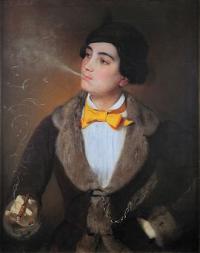
Die wilde Rose
Da droben auf einsamer Höhe
Die wilde Rose blüht,
Und wer sie von Ferne gesehen,
In heißer Sehnsucht erglüht.
Zu ihr über Felsen und Klüfte
Ein kühner Jäger klimmt.
Schon ist er in nächster Nähe –
Das Auge in Thränen ihm schwimmt.
Er will sie erfassen und pflücken.
Da strauchelt jäh sein Fuß;
Des Abgrunds finstere Tiefe
Empfängt ihn mit kaltem Kuß.
Da droben auf einsamer Höhe
Die wilde Rose blüht,
Und wer sie von Ferne gesehen.
In heißer Sehnsucht erglüht. –
Louise Aston
(1814-1871)
Die wilde Rose
• fleursdumal.nl magazine
More in: # Classic Poetry Archive, Archive A-B, Archive A-B, Feminism
“We are homesick everywhere,” writes Tishani Doshi, “even when we’re home.”
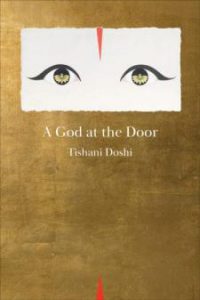 With aching empathy, righteous anger, and rebellious humor, A God at the Door calls on the extraordinary minutiae of nature and humanity to redefine belonging and unveil injustice.
With aching empathy, righteous anger, and rebellious humor, A God at the Door calls on the extraordinary minutiae of nature and humanity to redefine belonging and unveil injustice.
From a microscopic cell to flightless birds, to a sumo wrestler and the tree of life, Doshi interrupts the news cycle to pause in grief or delight, to restore power to language. A God at the Door invites the reader on a pilgrimage―one that leads us back to the sacred temple of ourselves. This is an exquisite, generous collection from a poet at the peak of her powers.
In an era of pandemic lockdown and brutal politics, these poems make vital space for what must come next―the return of wonder and free movement, and a profound sense of connection to what matters most. A GOD AT THE DOOR by TISHANI DOSHI invites the reader on a pilgrimage―one that leads us back to the sacred temple of ourselves. This is an exquisite, generous collection from a poet at the peak of her powers.
Tishani Doshi is an award-winning writer and dancer of Welsh-Gujarati descent. Born in Madras, India, in 1975, she received a masters in writing from the Johns Hopkins University, and worked in London in advertising before returning to India in 2001, where a chance encounter with the choreographer Chandralekha led her to an unexpected career in dance. She has published seven books of fiction and poetry, the most recent of which are Girls Are Coming Out of the Woods, shortlisted for the Ted Hughes Poetry Award and a Firecracker Award; and a novel, Small Days and Nights, shortlisted for the RSL Ondaatje Prize, the Tata Best Fiction Award, and The New York Times Bestsellers Editor’s Choice. She has interviewed over a hundred writers about the craft of writing, and has published essays in The Hindu, Granta, The National, The New York Times, The Guardian, Lithub and Corriere della Sera. She is a Visiting Professor of Creative Writing at New York University Abu Dhabi, and otherwise, lives on a beach in Tamil Nadu, India.
(. . . . .)
What if god on the other side of the wall
was equally alone and in need of company
What if we replaced god with home
What if I was ready to become nothing
What if I understood there was no me
Would you carry me to this divinity
A God at the Door
by Tishani Doshi
Format: Paperback
88 pages
ISBN: 9781556594526
2021 Copper Canyon Press
$16.00 list price
♦Forthcoming 9 November 2021
# new poetry
Tishani Doshi
• fleursdumal.nl magazine
More in: - Book News, - Bookstores, Archive C-D, Archive C-D, DANCE & PERFORMANCE, Tishani Doshi
What is it like to grow up in a place where the same police officer who told your primary school class they were special stops and searches you at 13 because ‘you fit the description of a man’ – and where it is possible to walk two and a half miles through an estate of 1,444 homes without ever touching the ground?
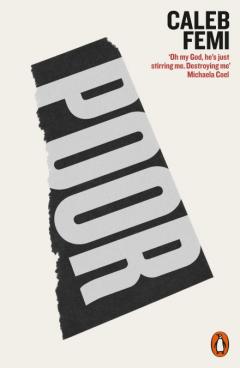 In Poor, Caleb Femi combines poetry and original photography to explore the trials, tribulations, dreams and joys of young Black boys in twenty-first century Peckham.
In Poor, Caleb Femi combines poetry and original photography to explore the trials, tribulations, dreams and joys of young Black boys in twenty-first century Peckham.
He contemplates the ways in which they are informed by the built environment of concrete walls and gentrifying neighbourhoods that form their stage, writes a coded, near-mythical history of the personalities and sagas of his South London youth, and pays tribute to the rappers and artists who spoke to their lives.
Above all, this is a tribute to the world that shaped a poet, and to the people forging difficult lives and finding magic within it. As Femi writes in one of the final poems of this book: ‘I have never loved anything the way I love the endz.’
Raised on the North Peckham estate in South London, Caleb Femi is a poet and director. He has written and directed short films for the BBC and Channel 4, and poems for Tate Modern, the Royal Society for Literature, St Paul’s Cathedral, the BBC, the Guardian and more. He has been featured in the Dazed 100 list of the next generation shaping youth culture. From 2016 to 2018, he served as the Young People’s Laureate for London. He recently wrote the liner material for Kano’s 2019 album Hoodies All Summer. This is his first book.
Poor
by Caleb Femi
Paperback
5 Nov. 2020
Publisher: Penguin Books Ltd
Language: English
160 pages
ISBN-10 : 0141992158
ISBN-13 : 978-0141992150
Dimensions : 13.2 x 1.2 x 20 cm
£9.99
# new poetry
Caleb Femi
• fleursdumal.nl magazine
More in: #Editors Choice Archiv, - Book News, - Bookstores, Archive E-F, Archive E-F, FLUXUS LEGACY
Thank you for reading Fleurs du Mal - magazine for art & literature